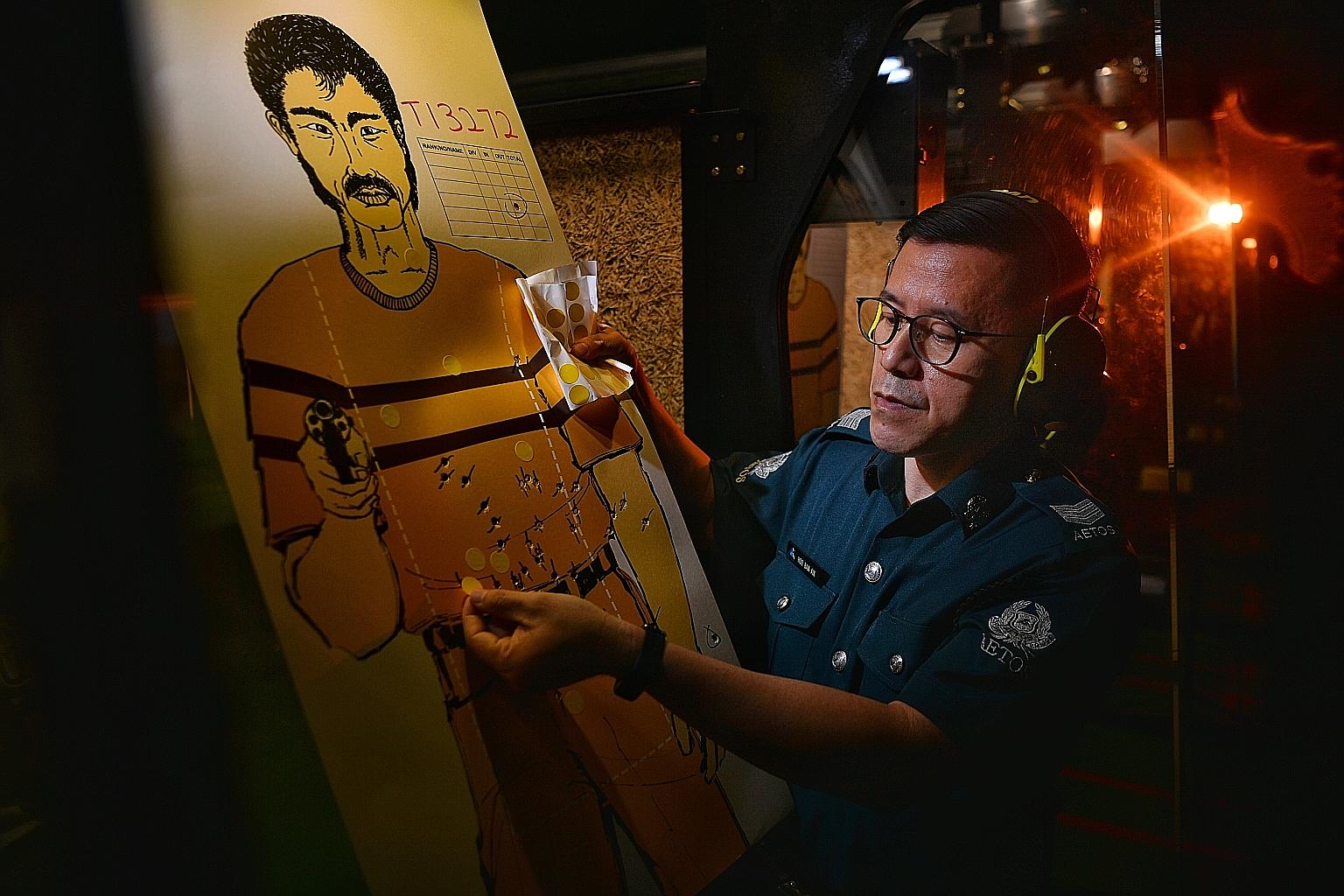Career conversions up amid coronavirus pandemic
More mid-careerists gain from PCPs - mainly to take on new, enhanced roles
Sign up now: Get ST's newsletters delivered to your inbox

Sergeant Hoo Ban Aik at the shooting range. He made the switch from his previous engineering job in the semiconductor industry to working on the security team at the Institute of Mental Health after taking up the PCP for Auxiliary Police Officer (Armed).
ST PHOTO: CHONG JUN LIANG
Follow topic:
Despite the economic uncertainties this year due to the Covid-19 pandemic, more employers have been tapping professional conversion programmes (PCPs) to reskill mid-career new hires or prepare current employees for new roles.
More than 900 companies took part in PCPs in the first half of this year, up about 13 per cent from the same period last year, said Workforce Singapore (WSG), the statutory board which develops and runs PCPs.
As a result, more than 2,600 mid-career individuals benefited in the first half of this year, about 20 per cent more than the number who did so in the first half of last year.
The increase was due mainly to more people taking up redeployment PCPs, which prepare them for new or enhanced roles in their existing organisation, said WSG.
Other types of PCPs provide training and job placements or work attachments in growth sectors.
For instance, the Singapore Management University Academy partners Straits Interactive, a data protection and privacy specialist, to jointly deliver the PCP for Data Protection Officers.
The place-and-train programme has, in the last three months, enrolled an average of three participants a month. Previously, its average monthly participation rate was one.
"The PCPs are particularly relevant during these challenging times when businesses need new skills as they repivot, and when our working professionals need reskilling to land new jobs that are particularly relevant for industry," said Dr Lim Lai Cheng, the academy's executive director.
There are now about 100 PCPs across more than 30 sectors, and the Government said in May that it will ramp up PCPs for mid-careerists as part of the 100,000 opportunities under the SGUnited Jobs and Skills Package over the next 12 months.
Participants' course fees and salaries or training allowances are subsidised by the Government to help them move into jobs or sectors with good career prospects.
Experts and past PCP participants said the right mindset and expectations are key to successful transitions with these programmes.
Mr Chris Spendle, Asean HR leader at human resource consultancy Mercer, said one challenge in matching the demands of employers and workers is in pay expectations for subject-matter experts or middle managers in specialised roles.

-
GET CAREER ADVICE
Job seekers exploring a mid-career switch can go to conversion.mycareersfuture.sg to find out more about professional conversion programmes (PCPs) by Workforce Singapore (WSG).
They can also visit one of the SGUnited Jobs and Skills Centres.
These satellite career centres are part of WSG's efforts to bring services deeper into the heartland so that job seekers can easily access career advice and guidance on the SGUnited Jobs and Skills Package, including information about the PCPs.
More details can be found at wsg.gov.sg/sgujscentre
"Workers may need to adopt a longer-term earning outlook and recognise that sometimes a short-term decrease in compensation to move into a new job is an investment in a new career path that will allow for greater earnings in the long run, as their current role's pay levels may stagnate," he said.
"This is especially the case in newly created fields, roles and skill sets where the benefits of being a first mover, and gaining the new skills ahead of one's peers, can really pay off in the long run."
He added that employers can use skills mapping and redesign selection processes, to ensure they do not overemphasise technical skills and overlook workers with the soft skills and personality traits to thrive in an increasingly uncertain world.
A spokesman for the National University of Singapore (NUS) said individuals keen on PCPs need to understand the industry, employers and jobs that they might be placed in after completing training.
"They will be 'converting' to new job roles which may have potential challenges in training and deployment, and thus, they need to adapt well and be resilient," she said.
NUS is a programme manager of two PCPs and training partner for another two.
Auxiliary police officer Hoo Ban Aik, 49, is one who made a big switch when he started work this year on the security team at the Institute of Mental Health.
He was retrenched in 2015 from his engineering job in the semiconductor industry as his company restructured, and did freelance delivery work for a few years. He was unable to find a full-time job in his previous industry.
Having always respected people in uniform, he joined security firm Aetos through the PCP for Auxiliary Police Officer (Armed) in October last year.
He attended a 12-week resident course which included physical fitness and shooting range training, as well as lessons in law and recognising terrorist threats. Sergeant Hoo said he booked out on Fridays and booked in on Sundays.
Despite being twice the average age among his batch of 12 trainees, he surprised himself by achieving the best results in the individual physical proficiency test.
"The instructors were very helpful and constantly motivated me. It's important to adopt the right mindset. If you work towards your goal step by step, you can achieve it," he said.

